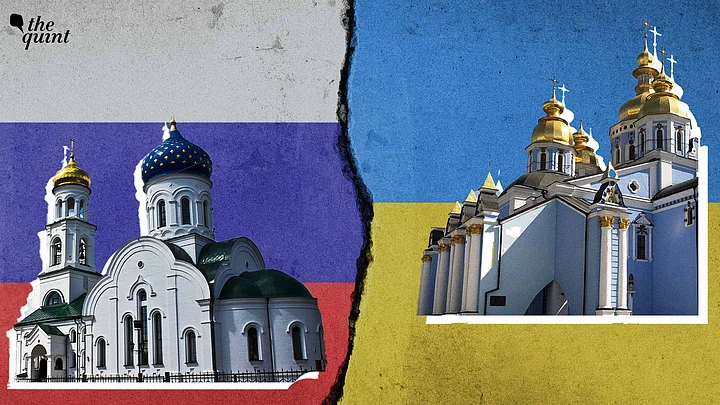Ever since Russia’s annexation of Crimea in 2014, it is not only the Russian and Ukrainian politicians and soldiers that have been fighting – their popes and priests have been at loggerheads too.
On 11 April 2018, when the Orthodox Easter was being celebrated in Ukraine, I was visiting St. Michael’s Golden-domed Monastery in Kyiv. Strolling down its huge but vacant courtyard, my guide informed me that the Ukrainian Orthodox Church had broken away from Russian Orthodox Church. “Now we have their two ‘popes’ -- one in Moscow and the other in Kyiv - warring against each other.” The Ukrainian pope had his offices in this monastery complex.
When Religion Meets Geopolitical Conflict
The split between the two churches was not yet official. Despite its political independence from Russia, Ukraine’s Orthodox Christians, comprising 70% of the population, were still under the tutelage of the Patriarchate of Moscow.
The Ukraine Orthodox Church (Moscow Patriarchate), aligned to Moscow, remained the officially recognised church. Though two Ukrainian Orthodox bodies broke away from Moscow’s authority after independence, they were not recognised by any of the fourteen self-governing churches that make up the global Orthodoxy.
Two days earlier, on 9 April, the former President of Ukraine, Petro Poroshenko while trying to brighten his fading political future, had travelled to Istanbul to request the Ecumenical Patriarch, Bartholomew I of Constantinople “the first among equals” or the pope of the Orthodox Christian world, to grant full independence to a yet to be established Orthodox Church of Ukraine.
The Moscow Patriarchate, concerned about their business being diverted, denounced the idea and warned Patriarch Bartholomew in Istanbul that if he accepted the Ukrainian request, Moscow would terminate its relations with him – leading to the biggest split in Christianity since 1054, when the eastern Orthodox church and Catholic Rome parted company.
The Russians cited a 1686 edict issued by Istanbul, following a historical dispute, making the Kyiv church answerable to Moscow. Thereby, said the Russians, Kyiv became a part of Moscow’s canonical territory and only the Moscow Patriarchate could grant independence to the Ukrainian church, and Istanbul had no jurisdiction in the matter.
Ukrainians hotly disputed the legitimacy of the edict, saying it was proclaimed under duress. Patriarch Bartholomew announced, in an exceedingly polite tone, that the 1686 order was provisional and not unconditional. In October 2018, after, undoubtedly, ensuring that the Ukrainians had paid all their bills and there was no amount outstanding, he formally withdrew the 1686 decision.
Ukraine’s president hailed this as “a great victory of the God-loving Ukrainian people over the Moscow demons; the victory of good over evil; the victory of light over darkness.”
Orthodoxy Loomed Large Over Both Nations
Patriarch Kirill of Moscow, losing his temper, reacted sharply by asking faithful Russians not to participate in communion or other sacramental rites in churches under the Ecumenical Patriarch Bartholomew’s authority. Any Russian believer who ignored this order would have to admit his disobedience and seek forgiveness – or be mashed to pulp.
On 7 January– the Orthodox Christmas Day of 2019 - President Poroshenko and Metropolitan Epiphanius I, elected as the primate, or archbishop, of the new Orthodox Church of Ukraine at the unification council held during the previous month, strode triumphantly into St. Sofia Cathedral holding a document signed by the Patriarchate of Constantinople granting the Ukrainian church complete independence from the Moscow Patriarchate. It had been the bitterest inter-Orthodox division for centuries.
All that remained for the 12,000 Moscow-aligned parishes in Ukraine was to integrate with the 7,000-odd parishes controlled by the Orthodox Church of Ukraine. There was a grand scramble to do so. The nocturnal visits by SBU, Ukrainian security service, to the houses of priests serving the Moscow-aligned parishes and investigating them for inciting hatred and violence, hastened the pace of the scramble.
The Russian efforts to raise an insurrection failed. They busied themselves counting their losses. As for President Poroshenko, this exercise gave him no political mileage – despite the supportive speech delivered, in a sycophantic frame of mind, by Metropolitan Epiphanius declaring that Poroshenko “ will forever go down in the history of the Ukrainian people next to the names of rulers, of our Prince Volodymyr the Great, Yaroslav the Wise, Kostyantyn Ostrozky and Hetman Ivan Mazepa”. Three months later, President Poroshenko, an eastern orthodox, was defeated by Volodymyr Zelensky, a television comedian and a Jew.
Putin Has The Backing Of Russian Church
President Putin and Patriarch Kirill, the head of the Russian Orthodox Church, continue to scratch each other’s back. Putin, secretly baptised by his mother as a child in communist USSR, strengthened Kirill by restricting competition from rival religious groups and building countless churches.
Kirill endorsed Putin’s presidency as a “miracle of god”. Had his platoons of priests bless bombs sent to Syria and Crimea, denounced the West for inflicting their decadent values on Russians and claimed that the ongoing conflict with Ukraine is a “geopolitical strategy aimed, first and foremost, at weakening Russia.”
Meanwhile, Patriarch Bartholemew, the head of Orthodox Christianity, visited the Ukrainian embassy in Istanbul to show his support and said of Ukrainian President Zelensky: “He gives such an example to his people. They don't want to surrender, and they are right. Why give up their freedom to the occupier?” The Patriarch also added that he fears being “targeted” by Russia.
The Ukraine conflict is not only a military disaster – but also a spiritual calamity
(Akhil Bakshi is the author of Ukraine: A Stolen Nation)
